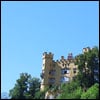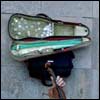There is a profit in the land over all else, for the king is sustained by the field
Ecclesiastes 5:8 (as per Ibn Ezra on verse)
Elul, the last month of the Jewish year, is a time of paradox — a time of what might be termed, "spiritual workdays."
The Jewish calendar distinguishes between two general qualities of time: "mundane" (chol) and "holy" (kodesh). Ordinary workdays are "mundane" portions of time; Shabbat and the festivals are examples of "holy" time. On "holy" days, we disengage ourselves from the material involvements of life to devote ourselves to the spiritual pursuits of study and prayer. These are also days enriched with special spiritual resources (rest on Shabbat, freedom on Passover, awe on Rosh Hashanah, etc.), each providing its unique quality to the journeyer through calendar and life.
In the latter respect, the month of Elul resembles the "holy" portions of the calendar. Elul is a haven in time, a "city of refuge" from the ravages of material life; a time to audit one's spiritual accounts and assess the year gone by; a time to prepare for the "Days of Awe" of Rosh Hashanah and Yom Kippur by repenting the failings of the past and resolving for the future; a time to increase in Torah study, prayer and charitable activities. Elul is the opportune time for all this because it is a month in which G‑d relates to us in a more open and compassionate manner than He does in the other months of the year. In the terminology of Kabbalah, it is a time when G‑d's "Thirteen Attributes of Mercy" illuminate His relationship with us.
Yet unlike Shabbat and the festivals, the days of Elul are workdays. On Shabbat, the Torah commands us to cease all physically constructive work (melachah). The festivals, too, are days on which melachah is forbidden. Regarding the month of Elul, however, there are no such restrictions. The transcendent activities of Elul are conducted amidst our workday lives in the field, shop or office.
Rabbi Schneur Zalman of Liadi explains the paradox of Elul with the following metaphor: The king's usual place is in the capital city, in the royal palace. Anyone wishing to approach the king must go through the appropriate channels in the palace bureaucracy and gain the approval of a succession of secretaries and ministers. He must journey to the capital and pass through the many gates, corridors and antechambers that lead to the throne room. His presentation must be meticulously prepared, and he must adhere to an exacting code of dress, speech and mannerism upon entering into the royal presence.
However, there are times when the king comes out to the fields outside the city. At such times, anyone can approach him; the king receives them all with a smiling face and a radiant countenance. The peasant behind his plow has access to the king in a manner unavailable to the highest ranking minister in the royal court when the king is in the palace.
The month of Elul, says Rabbi Schneur Zalman, is when the king is in the field.
The Field
Bread is the "staff of life" that "sustains the heart of man." There was a time when most everyone plowed, sowed and harvested the grain that sustained him and his family; but even today, when only a small percentage of us farm the land, we all labor for bread. Everyone works in the field — be it the wheatfield or cornfield, or the field of banking, steelmaking, medicine or advertising.
Indeed, the field is the prototype employed by Torah law to define the "work" that distinguishes between the holy and mundane days of the calendar. The Talmudic passage which lists the types of work forbidden on Shabbat reads:
The categories of work are forty minus one: sowing, plowing, reaping, making sheaves, threshing, winnowing, picking the chaff from the grain, milling, sifting, kneading, baking... (Talmud, Shabbat 73a)
Each of these activities represents an entire category which includes many different types of work. For example, leveling the ground to make a tennis court is tantamount to "plowing"; mixing cement is a form of "kneading"; sorting laundry would fall under the category of "picking the chaff from the grain." But the prototypes that head and dominate the list of forbidden labors are labors of the field. In the words of the Talmud, "The author of the Mishnah follows the process of bread-making."
For eleven months of the year, our lives alternate between the field and the palace, between the "process of bread-making" of material life and the sublime moments in which we leave the field to enter into the royal presence. In the month of Elul, however, the king comes to the field.
What happens when the king comes to the field? To understand the essence of Elul, we must first examine the relationship between the palace and the field — between Shabbat and the workweek, between the very concepts of "holy" and "mundane." Are they really as distant from each other as their very different faces suggest?
The Sanctuary
Let us take a closer look at the "work of the field" and the "process of bread-making" that defines our workday lives.
The Torah chooses a rather roundabout way to convey to us the 39 types of work from which we must desist on Shabbat and the festivals: by linking the laws of Shabbat to the laws of the Sanctuary.
Following the revelation at Sinai, G‑d commanded the people of Israel to construct a "Sanctuary" for Him. Detailed instructions were given to Moses on how to shape fifteen materials (gold, silver, copper, wood, flax, wool of various colors and several types of animal skins) into a "dwelling for G‑d in the physical world."
In both the 31st and 35th chapters of Exodus, the commandment to cease work on Shabbat and G‑d's instructions concerning the construction of the Sanctuary immediately follow each other. The Talmud explains that the Torah juxtaposes these two seemingly unrelated laws in order to teach us that the 39 creative acts which the construction of the Sanctuary necessitated are the same 39 categories of work that are forbidden to us on Shabbat:
A person is guilty of violating the Shabbat only if the work he does has a counterpart in the work of making the Sanctuary: they sowed (the herbs from which to make dyes for the tapestries — Rashi); you, too, shall not sow [on Shabbat]. They harvested [the herbs]; you, too, shall not harvest. They loaded the boards from the ground onto the wagons; you, too, shall not bring an object from a public domain into a private domain... (Talmud, ibid., 49b)
For the work of the Sanctuary is the prototype for the work of life. In the words of the Tanya, "This is what man is all about, this is the purpose of his creation and the creation of all worlds, supernal and ephemeral — to make G‑d a dwelling in the physical world."
In other words, the work forbidden on Shabbat and the festivals — the work that defines the difference between the "holy" and "mundane" days of our lives — is not mundane work at all. It is holy work — the work of forming the physical world into a home for G‑d. Why, then, are the days on which this work is done regarded as the "mundane" days of our lives? And why are the days on which we are commanded to cease this work "holier" than the days on which this work is done?
The Lookout Tower
Indeed, the difference between the "holy" and "mundane" times of our lives is not a difference in essence, only a difference in perspective. Yet the reality of physical life is that to achieve a change of perspective one must change the place and position from which one looks.
Beyond its mundane surface, the material world possesses a deeper truth — its potential to house the goodness and perfection of its Creator. The purpose of our workday lives is to reveal this potential — to develop the material world as a home for G‑d. But on the workdays of our life, this potential is all but invisible to us, obscured by the very process that serves to bring it to light. Our very involvement with the material prevents us from experiencing its spiritual essence. To do so, we must rise above it.
A "holy" day is an elevation in the terrain of time, a lookout tower that rises above the surface of our workday lives to behold the true essence of our world — the essence we are laboring to actualize. (In the words of our sages, "Shabbat is a taste of the World to Come.") Rising to these "lookout points" means interrupting our life's work; but without these periodic glimpses from a higher, more detached vantage point, our involvement in the material may well become an enmeshment. Instead of sanctifying the mundane, we may find ourselves being profaned by it.
So one day a week, and on special occasions throughout the year, we cease our work in "the field" to gain a more transcendent view of our workday labors. Then, when we reenter the so-called "mundane" days of our lives, the Shabbat or festival experience lingers on. Enriched with insight into the true nature of our labors, fortified by the vision of what our involvement with the material will ultimately achieve, our workday lives become more focused on their goal, and less susceptible to the diversions and entanglements of the mundane.
The Exception
For eleven months of the year, our lives alternate between the holy and the mundane — between the material labor of life and the spiritual vision of that labor's objective. For eleven months of the year, we must, at regular intervals, cease our work and rise above it in order to glimpse its soul and purpose.
The exception to this rule is the month of Elul. For during the month of Elul, the king comes to the field.
The king is the heart and soul of the nation, the embodiment of its goals and aspirations. The king, though sequestered behind the palace walls and bureaucracy, though glimpsed, if at all, through a veil of opulence and majesty, is a very real part of the farmer's field. He is the why of his plowing, the reason for his sowing, the objective of his harvest. No farmer labors for the sake of labor. He labors to transcend the dust of which he and his field are formed, to make more of what is. He labors for his dreams. He labors for his king.
So is the king in the field an apparition out of its element? Hardly. We may not be used to seeing him here, but is not the royal heart, too, sustained by bread? His bread may be baked in the palace, its raw ingredients discreetly delivered to a back entrance; the golden tray on which it is served may in no way evoke the loamy bed from which it grew; but it is the yield of the field all the same.
The king in the field is making contact with the source of his sustenance, with the underpinnings of his sovereignty. And the field is being visited by its raison d'être, by its ultimate function and essence.
Shabbat is when the farmer is invited to the palace. On Shabbat, his overalls are replaced with the regulation livery, his vocabulary is polished and his manners are refined, his soul and fingernails are cleansed of the residue of material life. On Shabbat, the farmer is whisked from the hinterland to the capital and ushered into the throne room.
But Elul is when the king comes to the field.
When the farmer sees the king in his field, does he keep on plowing? Does he behave as if this were just another day in the fields? Of course not. Elul is not a month of ordinary workdays. It is a time of increased Torah study, more fervent prayer, more generosity and charity. The very air is charged with holiness. We might still be in the field, but the field has become a holier place.
On the other hand, when the farmer sees the king in his field, does he run home to wash and change? Does he rush to the capital to school himself in palace protocol? But the king has come to the field, to commune with the processors of his bread in their environment and on their terms.
In the month of Elul, the essence and objective of life become that much more accessible. No longer do the material trappings of life conceal and distort its purpose, for the king has emerged from the concealment of his palace and is here, in the field. But unlike the holy days of the year, when we are lifted out of our workday lives, the encounter of Elul is hosted by our physical selves, within our material environment, on our working-man's terms.











Join the Discussion